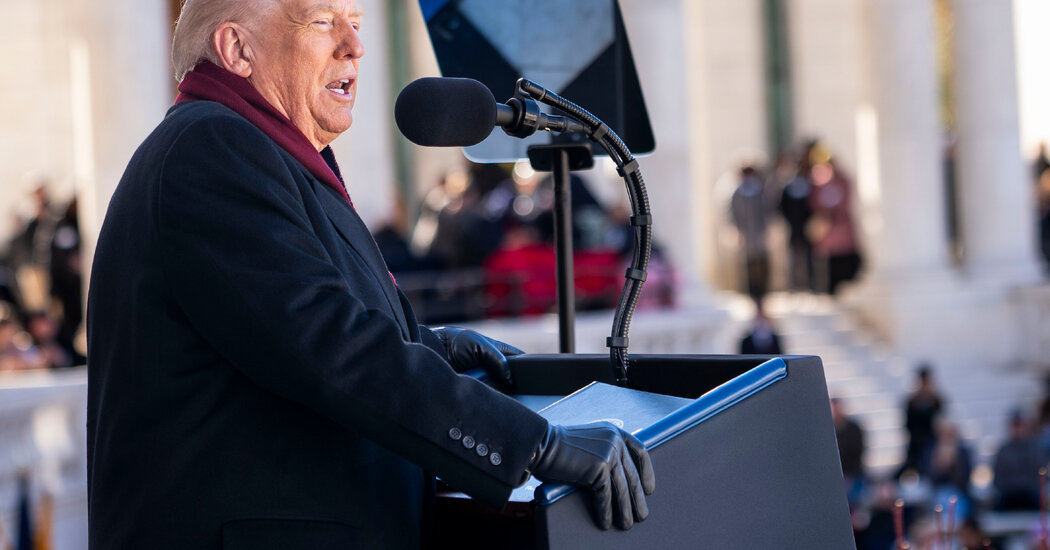Copyright The New York Times

President Trump on Tuesday said the apparent near end of the nation’s longest government shutdown amounted to a “very big victory” for Republicans during a Veterans Day speech that mixed the traditional solemnity of the day with a string of bare-knuckle political arguments. With Arlington National Cemetery as the backdrop, Mr. Trump also celebrated his efforts to remake the armed services into a “Department of War” more aligned with his political goals. After beginning with the customary paeans to service members, Mr. Trump quickly veered into a brief victory lap just a day after the Senate passed legislation to end the government shutdown. “We’re opening up our country,” Mr. Trump said after congratulating the Republican leadership in Congress. “Should have never been closed.” The break in the congressional gridlock came only after a critical slice of Democrats joined with Republicans and backed a spending package, even though the deal omits an extension of expiring federal health care subsidies Democrats had demanded. The measure, which now goes to the House, would quell concerns over how to pay federal workers and members of the military if the shutdown continued. While Mr. Trump paid the military during the shutdown by reprogramming funds and accepting a private donation from a billionaire, his administration warned that eventually the payments to service members would be at risk. “They said, Let’s close up our country,” Mr. Trump said of the Democrats immediately after his speech during an appearance on the “The Pat McAfee Show,” a daily sports talk show. “They were not successful in renegotiation, and it looks like it’s going to open up.” Mr. Trump also used the Veterans Day moment to talk up his decision to try to revert the Defense Department back to the Department of War, a name it used for 150 years until shortly after World War II. Formally changing the name would require sign-off from Congress, which the Trump administration has not received. “We brilliantly decided to change the name of this great, this great thing that we all created together, and we became politically correct,” Mr. Trump said. “We don’t like being politically correct.” “So we’re not going to be politically correct anymore,” he added. “From now on, when we fight a war, we only fight for one reason: to win.” Mr. Trump’s refusal to abide by the traditional strictures of such speeches reflected his larger relationship with the military, which he has begun to use in unconventional, and sometimes questionably legal, ways. He has recently shown more interest in the aggressive use of military might than in deterrence. His administration has been attacking boats in the Caribbean Sea and eastern Pacific Ocean that it says are smuggling drugs, even though a broad range of legal specialists on the use of lethal force have said the deadly strikes are illegal extrajudicial killings. He has also increasingly used the military to advance his domestic policy priorities, placing the armed forces at the center of partisan political issues. Mr. Trump also deployed about 10,000 troops to the southwestern border after he declared a national emergency over illegal border crossings. The troops are still there, even though crossings have plunged. Under Mr. Trump, thousands of National Guard troops and Marines were deployed to Los Angeles to help quell protests that erupted during immigration raids, eroding the morale of some service members. The administration has deployed the Guard to a number of other Democratic-led cities to help drive down crime, including Washington, where crime had already been falling. The domestic deployments are highly unusual, according to military historians, who say the military has at least tried to maintain the perception of being nonpartisan and the trust of the American public. James R. Stark, a retired rear admiral of the U.S. Navy who served during the Vietnam War, said members of the armed services had mixed views about Mr. Trump. “The military is not monolithic at all,” said Mr. Stark, who also worked on the National Security Council in the Reagan administration. “I think officers tend to be more questioning of Trump than the enlisted troops because he appeals to that macho side of people. But I think that you’ll find that most people in the military are ill at ease, are very uncomfortable, with the way that he’s starting to use the military.” Mr. Stark made his own views clear. “I think it’s ironic that President Trump is now lauding the military so much,” he said. “He uses it as his own personal toy almost.” Mr. Trump faced objections from veterans’ groups this year when he said he planned to change the name of Veterans Day to “Victory Day for World War I.” Critics of the move argued it would ignore the sacrifice of most living veterans. Mr. Trump did not end up changing the name, but a White House statement on Tuesday recognized the holiday by his preferred name. During his speech on Tuesday, Mr. Trump bragged about the firing of “thousands of people who didn’t take care of our great veterans” at the Department of Veterans Affairs, calling them “sick people.” But the Trump administration’s push to downsize the federal work force resulted in thousands of firings of federal employees who were veterans, Democrats on the House Appropriations Committee have said. And the upending of the federal bureaucracy has rippled across programs for veterans. Efforts to cancel federal contracts with Harvard set off a clash at the V.A. over the impact on medical research intended to help veterans. And Mr. Trump’s push to get federal workers back in the office forced many V.A. clinicians to work from crowded makeshift spaces, raising complaints that patient confidentiality was violated. Still, the Trump administration promoted its handling of veterans affairs issues on Tuesday, including opening 20 veterans health facilities across the nation.



